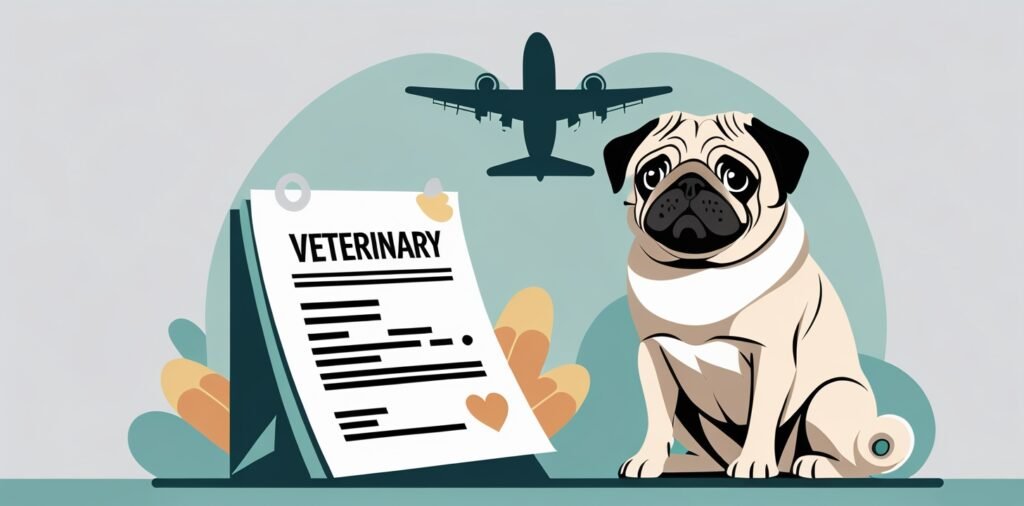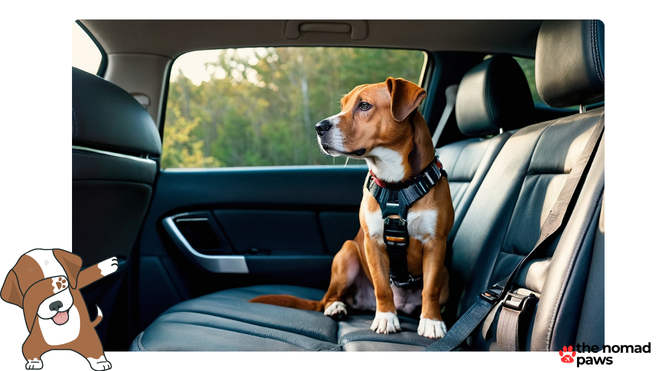Dog shipping costs average $450 to $2,000 for domestic air transport, $1,000 to $6,000+ for international routes, and $200 to $500 in additional fees for health certificates, crates, and documentation.
The final price depends on your dog’s size, the distance traveled, and the shipping method you choose.
Whether you’re relocating across the country or moving overseas, understanding these costs upfront is the key to budgeting properly and avoiding surprises.
This guide breaks down every factor that influences the price to ship a dog, from ground transport per-mile rates to international customs fees, so you can plan with confidence.
How Much Does It Cost to Ship a Dog? Key Factors That Affect Pricing

How much does it cost to ship a dog? Costs range from $200 to $4,000+ based on size, distance, and method. Several variables interact to determine your final price, and understanding each one will help you compare quotes accurately and spot inflated pricing.
Dog Size and Weight Impact on Costs
One of the most significant factors affecting the price to ship a dog is size and weight. The bigger the dog, the higher the cost, because larger dogs require bigger crates, more cargo space, and more resources during transport.
Small dogs like Chihuahuas or Yorkshire Terriers are the most affordable to ship. Domestic transport for small breeds typically costs $200 to $400. These dogs often qualify for in-cabin air travel, which is significantly cheaper than cargo.
Medium dogs like Beagles or Cocker Spaniels fall in the middle. Expect to pay around $300 to $600 for domestic shipping of a medium-sized dog.
Large dogs like German Shepherds or Labrador Retrievers require more space and often custom crates, which drives costs up considerably. Shipping a large dog domestically can range from $600 to $1,000 or more, especially if a custom kennel is necessary.
Tip: Some brachycephalic breeds (flat-faced dogs like Pugs and Bulldogs) face airline restrictions or seasonal embargoes. Always check breed-specific policies with your airline or transport company before booking.
How Much Does It Cost to Ship a Puppy?
How much does it cost to ship a puppy? Domestic air shipping for puppies starts at around $300 for small breeds. Puppies often qualify for in-cabin travel ($95 to $150 on most domestic airlines), which makes them cheaper to transport than adult dogs of the same breed.
However, puppies come with a timing challenge. Most airlines and transport companies require dogs to be at least 8 weeks old with completed vaccinations before travel. Since puppy vaccine schedules run through 16 weeks, you may need to delay shipping or arrange additional vet visits.
As a real-world example, shipping a Chihuahua puppy from New York to Los Angeles typically costs $300 to $500 total, including the health certificate and a small carrier. Larger breed puppies that must fly cargo will cost more, closer to $500 to $800 for the same route.
Warning: Puppies under 8 weeks old cannot legally be shipped by most carriers. Incomplete vaccinations can also disqualify a puppy from travel, so confirm your vet timeline before booking.
Distance and Destination
The distance your dog needs to travel plays a crucial role in determining cost. Longer distances and more complex routes result in higher pet relocation costs.
Local or short-distance transport is typically the most affordable option, often ranging from $100 to $300. Cross-country shipping runs $300 to $1,000 for coast-to-coast travel within the United States. International shipping is where costs escalate significantly, ranging from $1,000 to $6,000 or more depending on the destination country and its import requirements.
Urgency of Shipment
Need to ship your dog in a hurry? Be prepared to pay a premium. Rush services or last-minute bookings can significantly increase the cost of pet transportation. Planning ahead can save you up to 30% on shipping costs, so start the process as early as possible.
How Seasonal Changes Affect Dog Shipping Costs
Pet shipping costs fluctuate throughout the year, just like human travel prices. Understanding these patterns can save you real money.
During busy travel periods like summer and major holidays, pet shipping costs tend to increase. You might see price hikes of 10% to 30% during peak seasons. If your schedule allows, shipping during off-peak months (January through March, or September through November) typically gets you the best rates.
Extreme weather also affects pricing. Airlines impose embargo periods during very hot or cold weather, which limits available flights and drives up costs. Weather-related surcharges can add $50 to $200 to your shipping costs, so consider the climate at both origin and destination when planning your dog’s journey.
Key Takeaway: Shipping during off-peak months and booking 4 to 6 weeks in advance can reduce total dog shipping costs by 20% to 30%.
Ground Transport Costs for Dog Shipping

Ground pet transport costs $0.50 to $2.00 per mile, making it the more economical choice for distances under 1,000 miles. It is also a practical option for dogs that are not comfortable with air travel or breeds restricted from flying.
Short-Distance Ground Transport Costs
For trips under 300 miles, ground transport is a budget-friendly option. Prices typically range from $100 to $300, depending on the specific service and your location. This option works well for moves between neighboring states or within the same region.
Long-Distance Ground Transport Costs ($300 to $800)
For cross-country trips, ground transport can still be more affordable than air travel. Expect to pay between $300 and $800 for long-distance ground shipping. While it takes longer (sometimes 3 to 7 days for coast-to-coast routes), it can be less stressful for some pets and significantly easier on your budget.
When to Use Ground vs. Air Transport
Choosing between ground and air depends on distance, budget, and your dog’s temperament. Ground transport at $0.50 to $2.00 per mile is usually cheaper for trips under 1,000 miles. Beyond that distance, air transport becomes more competitive on a per-mile basis, and the shorter travel time reduces stress on your dog.
For a 500-mile trip, ground transport might cost $250 to $500, while air cargo for the same route could run $450 to $800. For a 2,500-mile cross-country move, ground transport at $500 to $800 starts to overlap with domestic air pricing of $450 to $1,000, but air gets your dog there in hours instead of days.
Cost to Ship a Dog by Air: Domestic vs. International

Air transport is often necessary for long-distance or international moves. It is faster but generally more expensive than ground options.
Domestic Dog Air Shipping Costs ($450 to $2,000)
Domestic air transport for dogs costs $450 to $2,000 one-way, depending on size. Small dogs that qualify for airlines that allow pets in cabin pay the least ($95 to $150 on most airlines). Medium and large dogs that must fly as checked baggage or cargo pay considerably more.
Costs vary widely by airline. Some charge a flat fee for cargo pets, while others calculate based on crate dimensions and weight. When comparing quotes, make sure you are comparing the same service type, because in-cabin, checked baggage, and cargo are three different price tiers.
International Dog Air Shipping Costs ($1,000 to $6,000+)
International pet travel is where costs climb steeply. Costs for international dog shipping range from $1,000 to $6,000 or more. This price includes factors like customs fees, health certificates, and sometimes mandatory quarantine costs.
Countries with strict biosecurity laws (like Australia and New Zealand) require extensive pre-travel testing, longer quarantine periods, and more documentation, all of which add to the total. Countries with simpler import processes (like most EU nations or Canada) tend to fall on the lower end of the range.
International Dog Shipping Costs by Destination

What is the average cost of international dog shipping? $1,000 to $6,000+, with Australia and parts of Asia at the high end. The destination country is the single biggest variable in international shipping costs because each country sets its own import requirements, quarantine rules, and documentation standards.
The table below provides estimated total costs, including airfare, documentation, customs clearance, and agent fees where applicable.
| Destination Region | Estimated Total Cost | Key Cost Drivers |
|---|---|---|
| Canada | $1,000 – $2,000 | Minimal paperwork, no quarantine |
| Mexico / Central America | $1,000 – $2,500 | Health certificate, import permit |
| European Union | $2,000 – $4,500 | EU pet passport, rabies titer test, microchip |
| United Kingdom | $2,000 – $4,500 | AHC documentation, tapeworm treatment |
| Asia (Japan, South Korea) | $3,000 – $6,000 | Rabies titer test (180-day wait), quarantine possible |
| Middle East (UAE, Qatar) | $2,500 – $5,000 | Import permits, breed restrictions |
| Australia / New Zealand | $8,000 – $12,000+ | Mandatory 10-day quarantine, extensive testing |
| South America | $2,000 – $4,000 | Varies widely by country |
Beyond the base shipping cost, international moves often involve customs clearance and agent fees ranging from $150 to $1,000. Many pet owners hire a professional pet relocation agent to handle paperwork, which adds cost but significantly reduces the risk of delays or denied entry at the destination.
Warning: Australia requires a minimum 10-day government quarantine at the Mickleham facility, which alone costs $2,000+. Combined with mandatory rabies titer testing and a 180-day preparation timeline, Australia is consistently the most expensive destination for dog shipping.
Pricing Variations Among Pet Transport Companies

Not all pet shipping companies are created equal, and neither are their prices. Understanding the range of options helps you find the right balance between cost and quality.
Budget-Friendly Options
Some companies offer more affordable pet transportation services with fewer extras. Prices for budget-friendly pet transport can start as low as $200 for short distances and $500 for longer trips. However, research thoroughly and check reviews to ensure you are not sacrificing safety for a lower price.
Premium Pet Transport Services
Premium services typically include door-to-door delivery, climate-controlled vehicles, GPS tracking, and dedicated handlers. Premium pet transport services can cost anywhere from $1,000 to $3,000 or more, depending on the distance and level of service.
Comparing Quotes from Multiple Providers
One of the best ways to ensure you are getting a fair price is to compare quotes from multiple pet transport companies. Price variations of up to 50% between different providers for the same service are common. Always get at least three quotes before making a decision.
Pet Shipping Cost Calculators and Quotes

Before committing to any provider, get a pet shipping cost estimate by inputting your dog’s size, the travel distance, and your preferred route into an online calculator. Several pet relocation companies offer free quote tools on their websites that give you a ballpark figure within minutes.
The most effective approach is to collect 3 to 5 quotes from different providers. Comparing multiple estimates can save you 20% to 50% on the same route and service level. When requesting quotes, provide your dog’s exact weight, crate dimensions, origin and destination addresses, and your preferred travel dates. The more specific you are, the more accurate the estimate.
Tip: When comparing quotes, make sure each one includes the same services. Some companies quote only the transport fee, while others bundle in crate costs, health certificate coordination, and door-to-door pickup. An apples-to-apples comparison prevents surprises later.
All Additional and Hidden Fees in Dog Shipping
When shipping your dog, the base transport price is rarely the final number. Additional costs for special accommodations and overlooked fees can add $200 to $500+ to your total.
Climate-Controlled Vehicles
If you are shipping your dog during extreme weather conditions, climate-controlled transport might be necessary. This ensures your pet remains comfortable regardless of outside temperatures. Expect to pay an additional $50 to $200 for climate-controlled transportation, depending on the distance and duration of the trip.
Individual vs. Shared Transport
Opting for individual transport means your dog will be the only animal in the vehicle. While this provides more attention and care, it comes at a higher cost. Individual transport can cost 30% to 50% more than shared options. Shared transport, where multiple pets travel together, is more budget-friendly but may take longer due to multiple stops.
Door-to-Door Service
Many pet shipping companies offer door-to-door service, picking up your dog from your home and delivering them directly to their destination. Door-to-door service can add $100 to $300 to your total shipping cost, but it eliminates the hassle of dropping off and picking up at terminals.
Common Hidden Fees to Watch For
Beyond the advertised price, several fees can catch you off guard if you do not ask about them upfront.
Fuel surcharges are common, especially for long-distance transport. These can add 5% to 15% to your total cost, so always ask whether they are included in the quoted price.
Handling fees may apply for large breeds or dogs requiring special care. These fees range from $50 to $200, depending on the specific requirements.
Crate rental or purchase is another cost many owners overlook. If you do not already have an airline-approved crate, prices range from $50 for small dogs to $400 or more for large breeds. Some companies offer crate rentals, which can be more economical for a one-time move.
Key Takeaway: Always ask for an itemized quote that lists fuel surcharges, handling fees, and crate costs separately. The cheapest base price often becomes the most expensive total once hidden fees are added.
Health Certificate and Vaccination Costs

Before your dog can travel, they need to be deemed fit for transport. These health-related expenses are non-negotiable and should be factored into every shipping budget.
Required Vaccinations
Ensuring your dog is up to date on vaccinations is required by virtually every airline and transport company. The cost for necessary vaccinations can range from $75 to $200, depending on which ones your dog needs and your location. For international travel, a rabies titer test may also be required, adding $150 to $300.
Veterinary Examination Fees
A pre-travel veterinary exam is typically required to obtain a health certificate. These exams usually cost between $50 and $150, depending on your veterinarian and location.
Health Certificate Processing
The health certificate itself, which declares your dog fit for travel, comes with its own fee. Health certificates typically cost between $50 and $100, and they are usually valid for only 10 to 30 days, so timing your vet visit correctly is important.
For international travel, you may also need a USDA endorsement of the health certificate, which adds another $38 per certificate and requires mailing or visiting a USDA-accredited office.
International vs. Domestic Dog Shipping Expenses
The cost difference between shipping your dog internationally versus domestically can be substantial. International moves involve layers of additional expenses that domestic shipments simply do not.
Customs and Import Fees
When shipping your dog internationally, you will need to navigate customs and import regulations. These fees can range from $50 to $500 or more, depending on the destination country. Some countries require import permits that must be obtained weeks or months in advance.
Quarantine Costs
Some countries require incoming pets to undergo a quarantine period. Quarantine costs can range from $200 to $2,000 or more, depending on the duration and facility. This is one of the largest potential expenses in international pet relocation and varies dramatically by country.
Additional Documentation for International Travel
International pet travel often requires significantly more paperwork than domestic trips. This might include additional health certificates, import permits, microchip verification, or rabies titer test results. Expect to pay between $100 and $300 for these extra documents, plus the time investment of coordinating everything within required timelines.
Pet Shipping Insurance Cost Overview

Investing in pet shipping insurance can provide peace of mind during your dog’s journey, especially for long-distance or international moves.
Types of Coverage Available
Pet shipping insurance typically covers issues like trip cancellation, emergency veterinary care during transit, and loss or damage to your pet’s carrier. Basic coverage can start as low as $50, while more comprehensive plans might cost $200 or more.
Factors Affecting Insurance Premiums
Several factors influence the cost of pet shipping insurance: your dog’s age and health condition, the value of your dog (especially important for purebred or show dogs), the distance and mode of travel, and the level of coverage you choose. On average, expect to pay between 5% to 10% of your total shipping cost for insurance.
Cost-Saving Tips for Shipping Your Dog
While shipping a dog can be expensive, there are practical ways to reduce costs without compromising on safety or comfort.
Booking in Advance
Early booking can often secure lower rates. Try to book at least 4 to 6 weeks in advance to potentially save 10% to 20% on shipping costs. For international moves, starting the process 3 to 6 months early gives you time to complete health requirements without paying rush fees.
Flexible Travel Dates
If your schedule allows, being flexible with travel dates can help you find better rates. Midweek travel is often cheaper than weekends, potentially saving you 5% to 15%. Avoiding peak travel seasons (summer and holidays) can save even more.
Choosing the Right Crate Size
Ensure you select the correct crate size for your dog. An oversized crate can increase your costs by 20% to 30%, so measure your dog accurately and consult with the shipping company for the appropriate size. Your dog should be able to stand, turn around, and lie down comfortably, but the crate should not be significantly larger than that.
Tip: Buy your own IATA-approved crate instead of renting from the shipping company. The upfront cost ($50 to $300) is often less than rental fees, and you can use it to acclimate your dog to the crate before travel day, which reduces stress.
Case Studies: Real-Life Dog Shipping Costs
To give you a concrete idea of what to expect, here are real-world examples of dog shipping costs across different scenarios.
Domestic Shipping Examples
Small dog (Chihuahua) from New York to Los Angeles:
- Air transport: $350
- Ground transport: $550
- Total including health certificate and crate: $625 to $825
Medium dog (Beagle) from Chicago to Miami:
- Air transport: $450
- Ground transport: $600
- Total including health certificate and crate: $750 to $900
Large dog (Labrador) from Seattle to Boston:
- Air transport: $800
- Ground transport: $950
- Total including health certificate and crate: $1,200 to $1,350
International Shipping Examples
Medium dog (Cocker Spaniel) from New York to London:
- Air transport: $1,500
- Additional fees (health certificate, customs, etc.): $500
- Total: $2,000
Large dog (German Shepherd) from Los Angeles to Sydney:
- Air transport: $2,500
- Additional fees (health certificate, customs, quarantine): $1,500
- Total: $4,000
These examples illustrate the wide range of costs you might encounter when shipping your dog. Your actual costs will vary based on specific circumstances, service providers, and current market rates.
Dog Shipping Cost Summary
The cost to ship a dog ranges from as little as $200 for short-distance ground transport to $12,000+ for complex international relocations to countries like Australia. For most domestic moves, expect to spend $450 to $2,000 total. For international shipping, budget $1,000 to $6,000+ depending on the destination.
The most important steps you can take to manage costs are straightforward. Get 3 to 5 quotes from different providers and compare them on an itemized basis. Book early to lock in lower rates. Choose the right transport method for your distance and your dog’s needs. And budget for the extras (health certificates, crates, insurance) from the start so nothing catches you off guard.
While cost matters, the safety and well-being of your dog should always be the top priority. Some breeds have special considerations for air travel, so always check breed-specific guidelines with your chosen carrier. By researching your options and planning ahead, you can ensure a safe and cost-effective journey for your dog. For comprehensive guidance on avoiding common pitfalls, check out our guide on pet relocation mistakes to ensure a smooth move.
Frequently Asked Questions
These are the most common questions pet owners ask when budgeting for dog shipping.
How much does it cost to ship a dog across the country?
Shipping a dog across the country costs $300 to $1,000 by ground and $450 to $2,000 by air. The final price depends on your dog’s size, the specific route, and whether you choose standard or premium service. Add $200 to $400 for health certificates, crate, and other essentials.
What is the cheapest way to ship a dog?
Ground transport is the cheapest option for distances under 1,000 miles, costing $0.50 to $2.00 per mile. For longer distances, in-cabin air travel (available for small dogs under 20 pounds) is often the most affordable at $95 to $150 on most domestic airlines. Booking during off-peak months and comparing multiple quotes can further reduce costs.
How much does it cost to ship a puppy?
Shipping a puppy domestically costs $300 to $500 for small breeds and $500 to $800 for larger breed puppies. Puppies that qualify for in-cabin travel pay $95 to $150 for the airline fee alone. Puppies must be at least 8 weeks old and have completed initial vaccinations before most carriers will accept them.
How much does international dog shipping cost?
International dog shipping costs $1,000 to $6,000+ depending on the destination. Shipping to Canada or Mexico is on the lower end ($1,000 to $2,500), while shipping to Australia can exceed $8,000 to $12,000 due to mandatory quarantine and extensive testing requirements.
Does pet shipping insurance cover my dog if something goes wrong?
Pet shipping insurance typically covers trip cancellation, emergency veterinary care during transit, and damage to the carrier. It does not usually cover pre-existing health conditions. Premiums run 5% to 10% of your total shipping cost, starting at around $50 for basic coverage.








